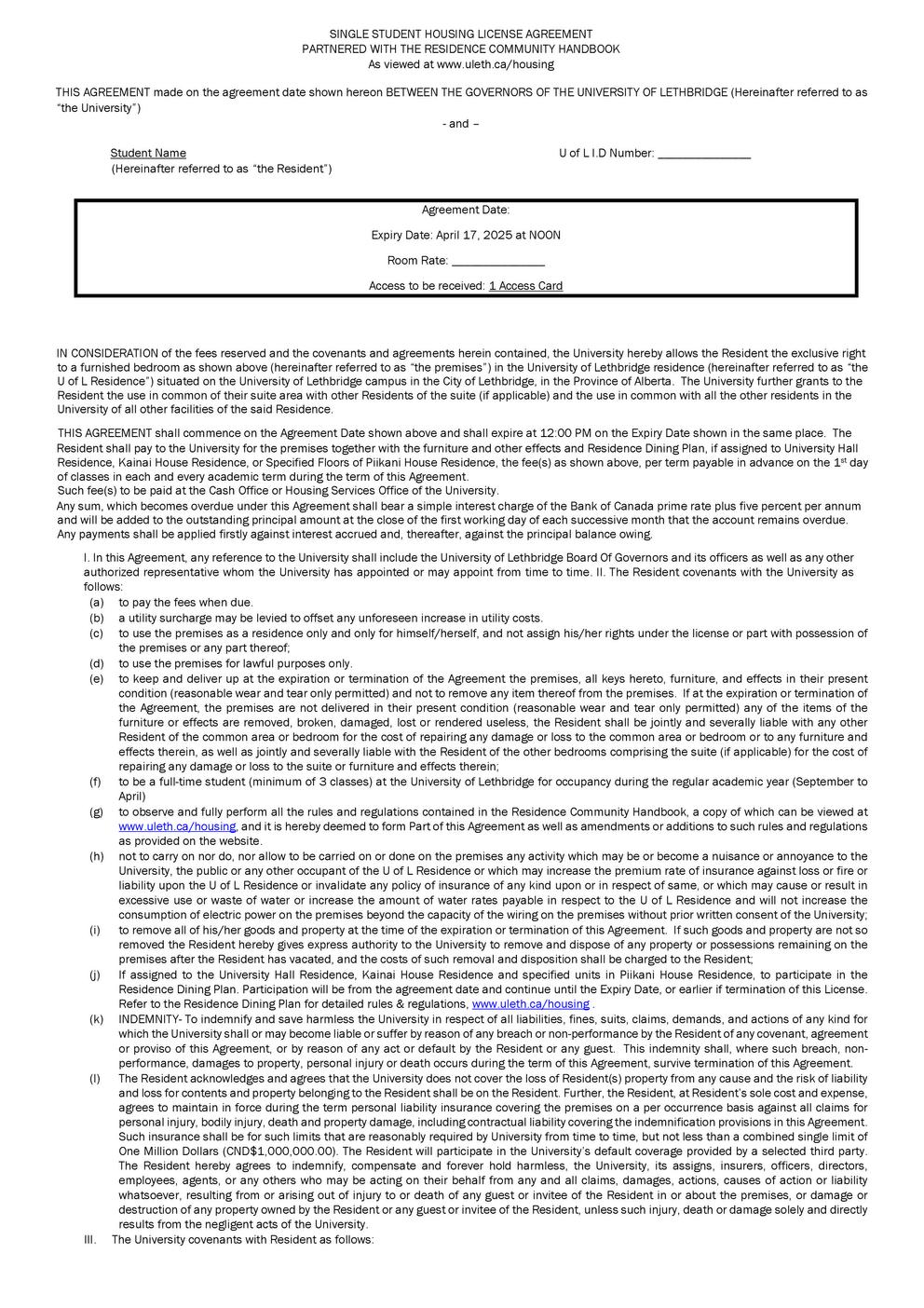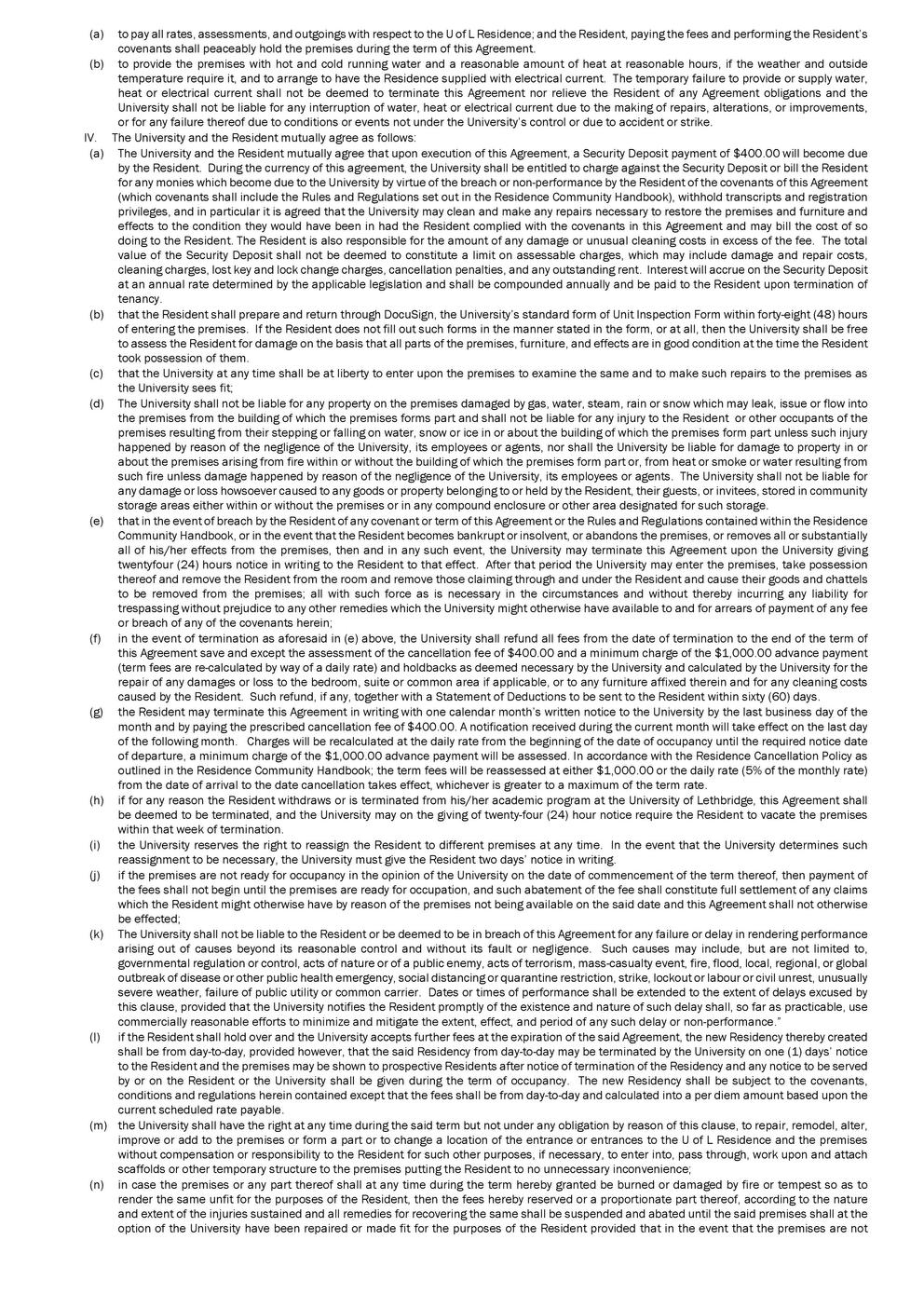














Oki, and welcome to Iniskim!
Elder Bruce Wolf Child named the University of Lethbridge “Iniskim”, meaning Sacred Buffalo Stone. Receiving this Blackfoot name is a great honour and holds the university accountable and responsible for having good relations with the Blackfoot and Siksikaitsitapi peoples. Housing Services is committed to working towards decolonization and uplifting the connection and contributions Siksikaitsitapi and Indigenous peoples have made to shape and strengthen this land and university community in the past, present, and future.
As Treaty 7 people, we acknowledge that we are situated on Blackfoot Confederacy land, which includes Kainai, Piikani and Siksika Nations. We are honoured to name our residence buildings after these nations and Blackfoot places of significanceas well as the Tsuut'ina Nation in Treaty 7 territory. We acknowledge there is still an immense amount of learning and growth to be done when it comes to reconciliation. We, as Treaty 7 people living and benefiting from Siksikaitsitapi land, must continue to honour the traditions of people who have cared for this land since time immemorial.

To provide a safe and welcoming home for the personal, academic, and social growth of University of Lethbridge students, alongside operational structures, policies, procedures, and programs. To allow our students to focus on their personal and academic goals while we support them with various social and academic events, building maintenance, and upkeep.
To provide clean, convenient, community-focused, and cost-efficient accommodations for on campus students to excel in their current academic careers and future aspirations.
We care about our Housing community and together we embrace the following core values: Trust: We act with integrity and assume the good intentions of others.
Respect: We treat others, ourselves, and our workplace with respect, holding ourselves accountable for our actions.
Commitment to Diversity: We value an environment where individual differences and diversity of thought have the opportunity to be included.
Belonging: We believe everyone should have the opportunity to find their place in residence, working together to create a community where everyone belongs.
Transformational Moments: We value the opportunity to facilitate life-changing or thought-shifting moments, paving the way for positive personal development.

Service to Others: We believe in serving the community, the campus, and the city through community involvement.
Health and Wellness: We promote an environment where health, wellness, and balance are valued, and provide opportunities for students and staff to take care of their minds and bodies.
Sustainability: We strive to make socially and environmentally responsible choices wherever possible.
Innovation and Technology: We embrace technological change and will take risks to improve our knowledge, skills, and efficiency.
Leadership: We promote the value of learning and encourage leadership development through collaborative decision-making and open communication.
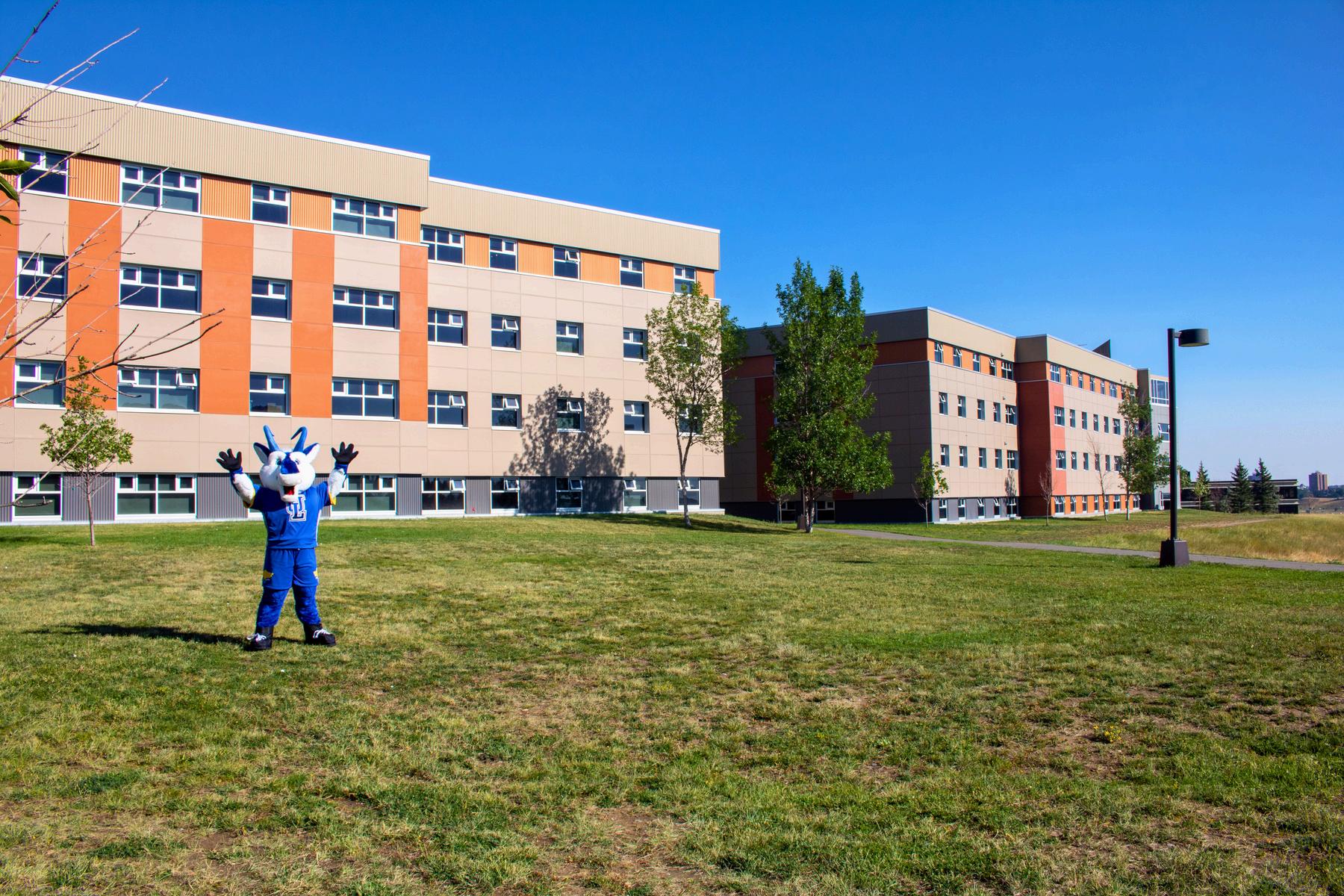
Welcome to the University of Lethbridge’s Housing community! This important document is the Residence Community Handbook which outlines rights, responsibilities, and rules while living in residence.
The contract (on page 30) covers daily residence living activities and extends to all residence-related events, whether in residence, on campus, or hosted off campus, including Organization of Residence Students (ORS) Council events and programs
Your privacy is important to Housing and we protect your privacy by not disclosing your whereabouts in response to inquiries by phone, in person, or at our Housing Services office
ORS: Organization of Residence Students
RA: Resident Assistants
CLHC: Campus Life Housing Coordinator
FOIP: Freedom of Information and Protection of Privacy
We, as part of the University of Lethbridge community, embrace and celebrate diversity in all its forms: race, nationality, age, gender identity and expression, sexual orientation, socioeconomic status, religious beliefs, ability, etc. Our community is strengthened by diversity and the growth fostered by an inclusive residence environment.
Every person deserves dignity and respect. We cultivate an environment of mutual respect, interpersonal curiosity, and positive interaction, fostering understanding and appreciation for each other.
We hold ourselves accountable for our actions, rejecting harassment, abuse, threats, or violence. Ignorance, anger, or substance abuse are not excuses for negative behaviour. Together, we build a supportive, inclusive community for students to live, learn, and flourish.
Only Housing Services can authorize, conduct, and manage maintenance, repairs, and replacements. This ensures work is completed to our standards. Do not attempt to repair any damage that has resulted from your actions. This includes but is not limited to repairing holes, doors, leaks, etc. You will be held responsible for the costs associated with undoing and redoing work.
Costs to clean, repair, or replace will be charged to those found responsible by Housing Services. If a responsible party cannot be determined, charges may be split between residents of the applicable unit, section, building, or residence community.
Costs for labour and notable materials are below. They are based on an established list of costs, as approved by the University of Lethbridge Board of Governors. All prices are subject to change without notice and any items not listed will be assessed at the item/material costs plus 10%. Please note, that a $100 Cleaning Fee will be applicable if there is evidence of smoking or vaping indoors, preparing cannabis edibles, or pet(s). Please review our smoking/vaping fees for more information below.
An administration charge of $10.00 will be applied to each charge notice assessed. Lockout
Room change
Smoking/Vaping 1st Offense
Unauthorized extended stay per night
Smoking/ Vaping 2nd Offense
Smoking/Vaping 3rd Offense
Service Charge
If you move to a different room during the academic year that charges a different room rate than your original room, your account will be prorated to reflect the cost of the new room for the remaining academic year
Your residence charges/fees can be viewed by logging onto your Bridge account. To make payments towards your statement of account, follow the payment methods listed on the Bridge under the Registrar's Office and Student Services tab - Cash Office
Canceling your agreement is a major decision. Please consult Housing Services staff for information such as deadlines, costs, and referrals. If you decide to cancel your agreement, notify Housing Services in writing.
Notification received during the current month takes effect on the last day of the following month.
A cancelation charge of $400 always applies. Your term fees will be reassessed at either $1000 or the daily rate (5% of the monthly rate) from arrival to the date cancelation takes effect, whichever is greater, to a maximum of the term rate. If you are withdrawing from ULethbridge, you must notify Housing Services and cancel your agreement immediately following confirmation of your withdrawal. You will be expected to move out within 48 hours.


You must maintain full-time ULethbridge student status (min. 9 credit hours/term). Should extenuating circumstances prevent this, you must receive written permission from Housing Services to remain in residence.
You are required to have at least one emergency contact listed in The Bridge, who you authorize Housing Services and the University to notify in the event of a critical incident. An authorized designate is not sufficient. A critical incident is defined as any situation, be it perceived or real, that has occurred or has the potential to occur, and involves any aspect of an unsafe environment, concerning or worrisome behaviour, unresponsiveness or incoherence, potential harm to one’s self or another, or life-threatening medical need.
If the resident is a minor – Emergency contacts will be notified for any critical incident.
If the resident is over the age of majority (≥18) – Emergency contacts may be notified for any critical incident that involves transportation by an emergency service due to unresponsiveness/incoherence, or risk of serious harm to self or another.
Quiet hours ensure an environment allowing a reasonable amount of rest. They are in effect 11 pm – 8:30 am Sunday to Thursday nights and 12 am – 8:30 am Friday and Saturday nights. Outside of quiet hours, residence students are expected to maintain a respectful volume that is not unreasonably disruptive to others.
As the end of the semester approaches, including the last week of classes and final exams, 22-hour Quiet Hours come into effect, where quiet hours are from 8 pm – 6 pm the next evening, seven days a week.
If you are over the age of majority (≥18), the Freedom of Information and Privacy Protection Act (FOIP) prohibits ULethbridge and Housing Services from sharing or discussing your file with anyone other than yourself; we will not disseminate photos, billing details, or addresses to another party or individual. If you wish to have Housing Services share information (with a parent, guardian, or designate) please contact us to complete the proper authorization.
The only pets permitted in residence are fish that can live ethically in an aquarium no larger than 38 liters (5 gallons). Medically prescribed comfort animals or therapy animals are not permitted. Immediate removal and a minimum 2-hour cleaning charge will apply. Pets include but are not limited to, cats, dogs, birds, hamsters, bunnies, guinea pigs, snakes, and turtles.
With prior notice and authorization by Housing Services, qualified service dogs, as defined in the Service Dogs Act of Alberta, are permitted in residence. You will be asked to provide a Government of Alberta identification card for your service dog and you are responsible for them at all times, as per relevant legislation.
Wired internet is available in your bedroom through the port in the back of your phone in rooms that DO NOT have a white Cisco Box installed. In these rooms, your wired internet connection is provided directly from the Cisco box. Wireless internet is also available. Login to the ‘UofL Students’ network using your U of L username and password!
For questions about phone/internet service, visit ulethbridge.ca/information-technology or contact IT at help@uleth.ca

Located in C420 in University Hall, the Housing Services Office operates from Monday to Friday, with hours from 9 am to 12 pm and 1 pm to 4 pm. They are available by phone until 4:15 pm. You can reach them at 403-329-2584 or email housing@uleth.ca. For more information or services, you can visit their website at uleth.ca/housing.
Accessible at L911 and operate 24 hours a day seven days a week. You can contact them at 403-329-2345 or email security.ops@uleth.ca. For more details or safety information, visit their website at uleth.ca/campus-safety.
Emergency services, including Ambulance, Police, and Fire, are available 24 hours a day, seven days a week. In case of an emergency, dial 911 immediately.
All maintenance requests must be done online. You will need your ULeth username and password to log in to the student portal to create an online maintenance request.
For fires, floods, etc. please contact Security Services immediately
When Housing Services is closed, each facility has its own Residence Assistant on Duty (RAD), as indicated below. RADs are available from Monday to Friday from 4:15 pm to 9 am, and on Saturdays, Sundays, and holidays, they are available 24 hours a day.
Mail is delivered by 11:30 am and 3:00 pm weekdays to Housing Services and then sorted. You will be notified of parcels via email; bring your photo ID to Housing Services to claim. Unclaimed mail will be returned to the sender thirty (30) days after the term ends. COULEE VIEW
Piikani House and Kainai House
We are committed to promoting and supporting the mental health and wellness of our students and the residence community. The University of Lethbridge offers a variety of services in support of student well being and Housing Services works in collaboration with these services to facilitate healthy and successful residence experiences.
On–Campus Resources
Campus Safety After Hours: 403-329-2345
Counselling Services: 403-317-2845
Health Centre: 403-329-2484
FNMI Student Services: 403-394-3902
Campus Collective Centre: 403-329-2094
U of L Chaplaincy: 403-382-0294
Roman Catholic Spiritual Support: 403-327-8931
Off-Campus Resources
24-Hour Distress Line: 403-327-7905 or 1-888-787-2880
Alberta Health Link: 1-866-408-5465
Harbour House Women’s Shelter: 403-320-1881
Mental Health Helpline: 1-877-303-2642
Lethbridge Family Services: 403-317-4624
Lethbridge Police Services: 403-328-4444
Lethbridge Regional Hospital: 403-388-6111
Sexual Violence Crisis Line: 403-320-1811 or 1-866-2960447
Suicide Prevention Crisis Line: 1-866-667-8089
For more information and more resources you can access Mental Health Services on the University website.
Should there be concerns regarding your mental well-being, you may be asked to join us in implementing a Self-Care & Safety Plan which outlines the supports and resources available including those offered on a 24/7 basis.
The intention of the Self-Care & Safety Plan is to highlight shared accountability in self-care and safety planning, available resources and the support available to access those resources.
Out of concern for your wellbeing and the wellbeing of our resident community, in situations where your behaviour and mental health jeopardize your wellbeing and/or the wellbeing and safety of others or exceeds our capacity to support you, you may be required: (i) to take a leave from residence until your health is restored; and/or (ii) to find alternate accommodations off campus that better suit your needs.
We recognize that physical health can also contribute to the well-being of students’ mental health. In campus housing, we offer two fitness rooms in Piikani (P104) & Mt. Blakiston (BE124).
When paying tuition, students are enrolled in the Sports and Recreation Services fee. This gives access to the University gym which offers a fitness centre, fitness classes, an open gym, pool access, an indoor track, intramurals, a fitness centre, rock climbing and bouldering, and a steam room. For more information on these services you can access the Horns and Recreation website.

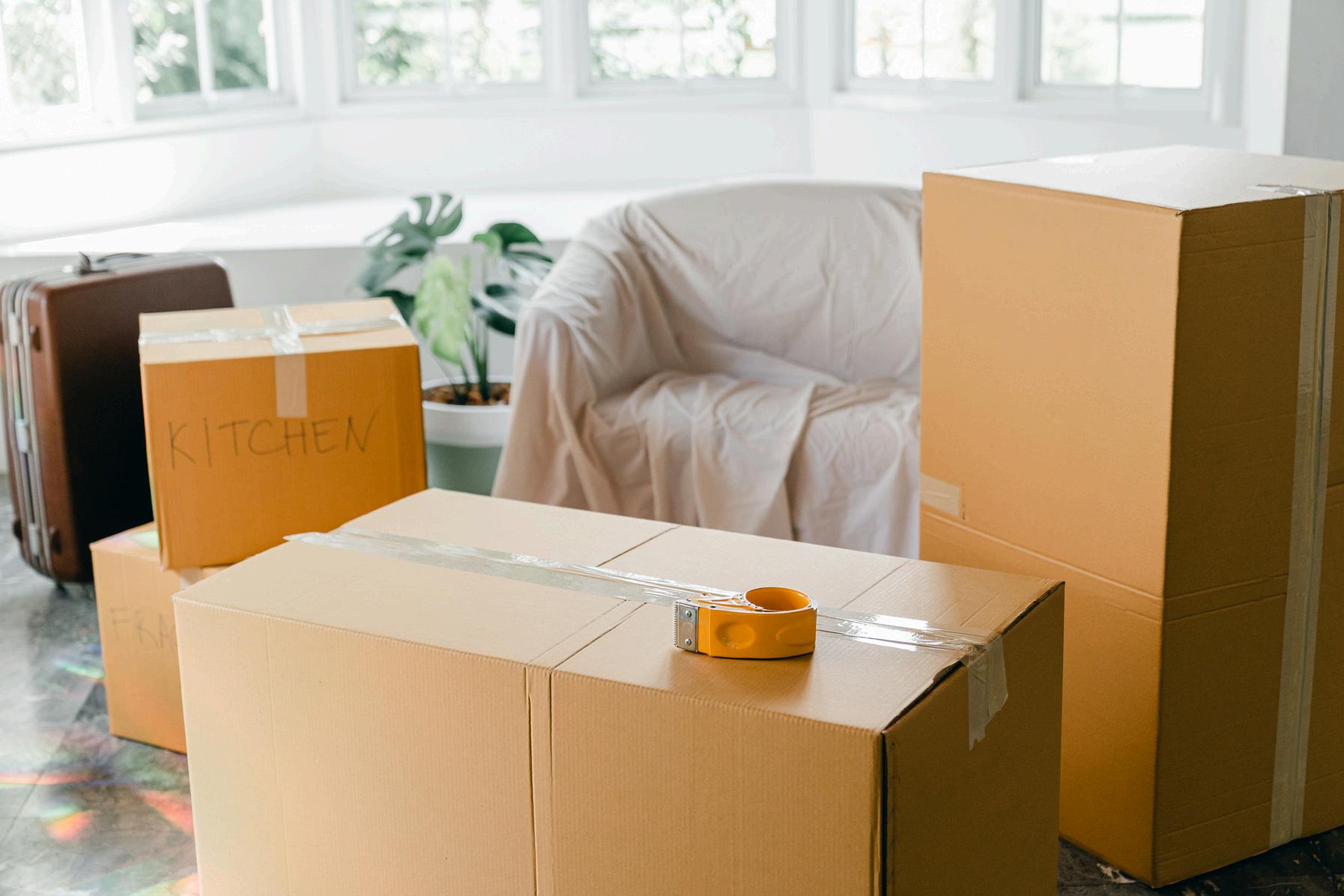
Students may remain in residence during Fall Reading Week and Winter Reading Week; however, limited food service is available in designated residence food outlets during this time. For the winter break between semesters, all residents must email Housing Services if they are planning to stay on campus
The university closes from December 24th to January 1st. If you are planning on staying over the winter break please contact housing@uleth.ca. Those staying will be provided additional information such as food you can order and purchase through the dining plan prior to our food outlets closing.
You are responsible for thoroughly cleaning your unit prior to move–out and meeting the cleaning expectations detailed in the move-out letter emailed to you and in your contract. After assessing the condition of your unit at move-out and comparing it with your UIF, you may be charged cleaning and outstanding fees which will be reflected on your security deposit return. Security deposits will be released within eight weeks of move-out. Any belongings left behind are held for 30 days and then donated.
Should you wish to appeal any assessment relating to damage, please review our Online Appeal Process and submit an online appeal. Any charges assessed will stand until formally overturned through the appeal process. Only online appeals will be considered. Please refer to pg. 22 for more information
You are responsible for canceling subscriptions/deliveries; Housing Services is not responsible for resulting charges/fees.
Requests for late move–outs will be considered if you have a final exam/practicum scheduled on the afternoon of the last day of the agreement. Written requests for late move out must be submitted at least two weeks prior to the last day of your agreement and be accompanied with proof (i.e. copy of final exam schedule). Approvals are subject to availability.
You are not considered to have moved out until your keys have been received at Housing Services (C420). If you have a late move–out without proper authorization, you will pay a penalty of $100 for the first night, then your unit’s daily rate for each additional day until the keys are received. Units with keys left inside will be considered late move-outs until keys are received by Housing Services. Keys not returned are subject to applicable lost key charges.
Provide Housing Services with written notice
Must be completed and received by Housing Services on or before the last business day of the previous month to make the notice effective for the last day of the following month. Notice provided after the last business day of the month shall not be effective until the end of the following month.
If withdrawing from the University, provide documentation from the Registrar's Office
Students withdrawing from the university mid-semester are required to provide notice as soon as they are aware that they are withdrawing.
Withdrawing students are to follow the normal move-out procedures.
A cancellation fee of $400.00 is assessed for breaking the contract.
The charge applies in all instances, whether the student cancels his or her residency or the Housing Services office initiates the cancellation.
NOTE: A MINIMUM CHARGE OF $1000.00 WILL BE ASSESSED. PLUS $400.00 CANCELLATION FEE.
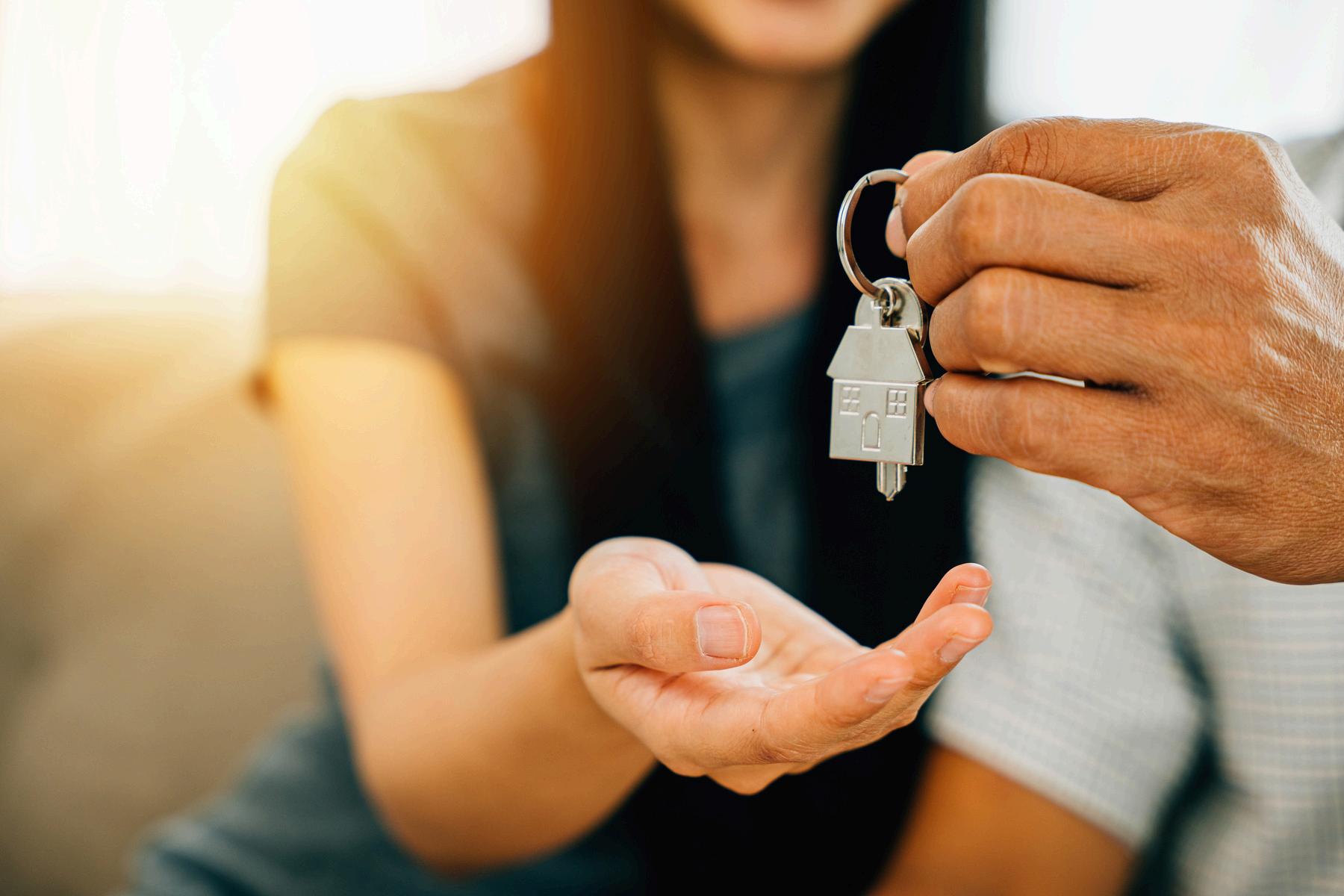
Housing Services reserves the right to terminate your Residence Contract, reassign you to a different unit or building, and to affect other measures for reasons that include but are not limited to, the safety, security, and conduct of the residence program. This may include a different bedroom and a different section or building. Housing fees may be applied to reflect the room change.
You are not permitted to sublet your residence room or offer residence spaces on rental services such as (but not limited to) Airbnb.
Room changes are possible after the first four weeks and before the last four weeks of each term. To request a room change, complete and submit a Room Change Request form to Housing Services. Please explore all other options before requesting a room change. You may find a resolution through a conversation or review of your Roommate Contract. Your RA is an excellent resource in providing guidance, support, and open communication.
If a vacancy occurs in your room or suite, you must:
Keep the unoccupied portion of the room in a condition that would allow a new roommate to move into the room on short notice; and Display a welcoming attitude of respect, cooperation, and acceptance toward any resident who is newly assigned to your room/suite.
The Housing Services office will endeavor to fill the space as quickly as possible by consulting the residence waiting list.
Living with roommates can be one of the best residence experiences, but also one of the most challenging. Effectively sharing a living space requires ongoing, in-person communication that is open, honest, and respectful.
Roommate Contract
Upon moving in, you'll fill out a Roommate Contract, a chance for you and your roommates to discuss living habits, expectations, personal priorities, and concerns. This contract helps address common challenges, increasing the chance you and your roommates have a great experience living together. Through discussion, understanding, teamwork, and compromise, you'll establish agreed-upon guidelines and rules. Completed contracts are then reviewed and approved by your RAs.
Roommate Conflict Resolution Model
Even after you’ve completed your Roommate Contract, maintaining a great roommate relationship requires communication and addressing concerns – this is normal.
These following steps act as a guide in developing and maintaining your experience living together.
Have a respectful, in-person discussion with your roommates to communicate the concern and find a resolution
Inform your RA. They can help prepare to have a discussion, facilitate the discussion, and/or find a resolution
Depending on the severity, your RA may seek guidance from, or involve a Vice-President and/or Housing Services
Tenant insurance is a requirement for all students living in residence at Ulethbridge, including International Students.
Housing Services is not responsible for property belonging to you or any of your guests which is lost, stolen, or damaged in any way regardless of cause; whether or not this may occur in your accommodation or on the residence property, including storage facilities.
You will be held financially liable for damage to residence buildings or property that results from willful or negligent actions by either you or your guest(s). Even though it may not be your intention to damage Housing Services’ property, you will be held liable for any such damages. Further, you will be held responsible for any and all damage costs resulting from frozen and/or burst pipes caused by you or your guest(s) failing to keep your windows closed in cold temperatures.
All residents will automatically be enrolled in a tenant insurance program through the University of Lethbridge. Each resident will be charged a tenant insurance fee of $85 for the 8-month academic year and will be required to pay this fee along with their residence fees by the payment deadline. Students staying in residence for the summer (May-August) on a 12-month contract are covered for no additional charge. This coverage will include: contents coverage, personal liability coverage, and additional living expenses. For more details, please see our Tenant Insurance Program Brochure
Label all belongings clearly with your first and last name. Handle all valuable items personally; do not delegate this task to Housing Services staff/volunteers. This includes all electronics, musical instruments, jewelry, textbooks, cash, gift cards, etc. Housing Services is not responsible for any loss or damages to your belongings during move-in, whether they are handled by Housing Services staff/volunteers, and you will not receive compensation for any lost, misplaced, damaged, or broken items during this process.
You may leave personal property in your room during statutory holidays, Reading Weeks, and the Winter Break unless Housing Services indicates in advance a need to have the room vacated. You should always take valuable items (e.g., jewelry, computers, TVs, etc.) with you when you leave as Housing Services cannot guarantee the security of personal belongings in your room. It is your responsibility to ensure your doors and windows are locked whenever you are not in your room.
The required security deposit is $400. Your security deposit will be released within eight weeks of moving out, after any charges and fines have been assessed and applied to your deposit.
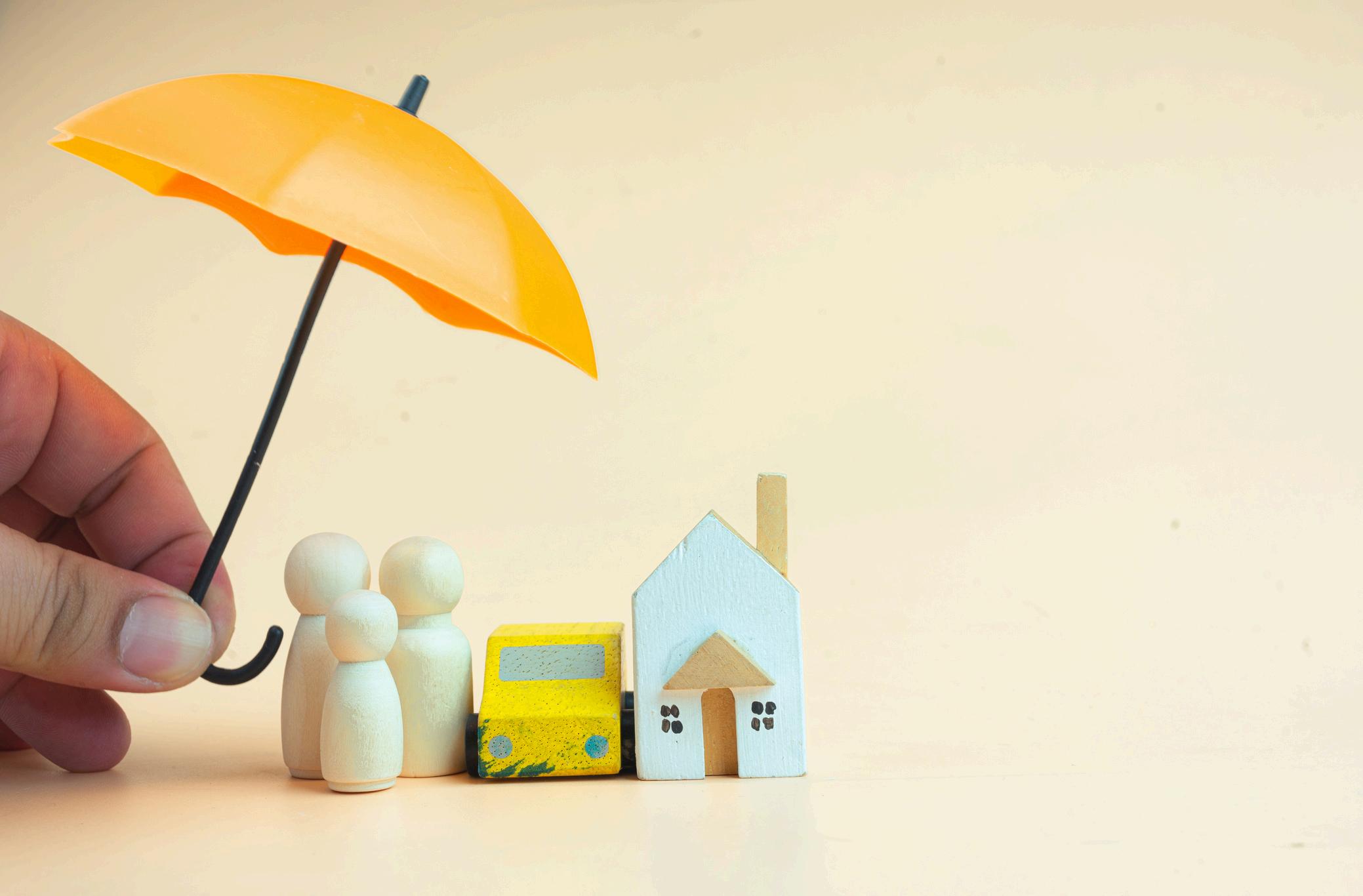
Below are rights, responsibilities, and privileges applying to residence students. They are not legally binding or formal policies, but guidelines, expectations, and standards for the residence community as a whole.
Rights are what you can expect and responsibilities are what is expected of you.
It’s your right to be heard and listened to
It’s your right to live in a safe and secure residence environment
It’s your right to have your unit be reasonably peaceful and quiet; enough to study and sleep
It’s your right to be treated with respect, and dignity, and free of discrimination
It’s your right to feel comfortable in your unit and residence
It’s your right to have reasonable privacy in your unit and proportionate use of the shared spaces
It’s your right to receive assistance, guidance, and support from your RAs, VP, and Housing Services and University staff
It’s your right to choose your means of socialization, recreation, and relaxation
It’s your right to be informed of what is and what is not acceptable, tolerated, or allowed in residence and on campus
It’s your responsibility to hear others and listen when they speak
It’s your responsibility to assist in maintaining the safety and security of the residence environment which includes reporting to the proper authorities
It’s your responsibility to assist in maintaining your unit as reasonably peaceful and quiet; enough to study and sleep
It’s your responsibility to treat all people with respect and dignity and maintain an environment free of discrimination
It’s your responsibility to communicate challenges and problems in a timely manner
It’s your responsibility to cooperate with staff as they guide and support you through a concern or situation
It’s your responsibility to respect and adhere to decisions made by RAs, VP, and Housing Services and University staff
It’s your responsibility to know and abide by local, provincial, and federal laws
It’s your responsibility to read and know the information provided by Housing Services
Privileges are opportunities provided to you that are intended to enrich your overall experience. Privileges are maintained by upholding your responsibilities.
It’s a privilege to live in residence
It’s a privilege to be allowed visitors and an overnight guest
It’s a privilege to attend events and activities offered in residence
It’s a privilege to use the provided facilities, services, and amenities

The following items are prohibited in residence. Should such items be discovered by Housing staff, they may be disposed of at your expense, in addition to any sanctions imposed upon you for violating this provision:
Candles and incense. These items are strictly prohibited (contact your Campus Life Housing Coordinators (CLHCs) if you are required to burn any substance for religious purposes)
Cannabis plants
Drum sets and pianos
Exercise machines (treadmills, stationary bikes, etc.)
Funnels, beer-pong tables, and any other high-risk drinking paraphernalia
Furniture (including but not limited to desks, mattresses, beds, headboards, waterbeds, tables, etc.)
Halogen lamps, LED strip lighting
Heaters and heat lamps
Large-volume alcohol containers (kegs, mini-kegs, or liquor bottles greater than 40 fluid ounces, etc )
Water coolers
Weapons and imitation weapons (firearms, knives, Swiss Army knives, pellet guns, paintball guns, firecrackers, cap guns, etc )
All students and members of the University community are required to abide by ULeth’s policies on discrimination and harassment: Harassment and Discrimination Policy
You must comply with the Sexual and Gender-Based Violence Prevention Policy found here
ULethbridge’s Policy on Sexual and Gender-Based Violence is the foundation of our commitment to support an environment in which members of the University Community can work, live and learn in a collegial climate of respect, in which Sexual and Gender-Based Violence is not tolerated, and share the responsibility for achieving these goals. ULethbridge also has procedures to respond to sexual and gender-based violence to support community members of our campus, regardless of where an incident of gender-based violence has occurred.
Sexual and Gender-Based Violence means a sexual act or acts, targeting a person’s sexuality, gender identity or gender expression – whether the act is physical or psychological in nature, whether in person or through other forms of contact –that is committed, threatened, or attempted against an individual without that individual’s Consent. Sexual and Gender-Based Violence includes, but is not limited to, the following: sexual assault, sexual harassment, stalking, indecent exposure, voyeurism, cyber harassment and sexual exploitation. Consent means the voluntary and mutual agreement to engage in the act or acts in question and to continue to engage in the act or acts. The voluntary agreement to engage in the activity or to continue to engage in the activity must be communicated through words and/or conduct. It is the responsibility of all persons who wants to engage in physical contact or sexual activity to make sure that they have Consent from the other person(s) involved. Consent is clear, explicit, active, ongoing, voluntary, informed and conscious. Asking for consent and respecting the response you receive ensures everyone involved feels safe and wants to proceed. You must obtain consent before initiating and continuing with any intimate and/or sexual activity.
Consent is not:
Given by a third party
Obtained through pressure, abuse of power, abuse of trust, or abuse of authority
Obtained through coercion, force, or threat of force
Obtained if the person is unconscious, sleeping or significantly impaired by drugs or alcohol
Obtained if the person does not say yes, says no or through words or behaviour that indicates no
Obtained when the person changes their mind and chooses to no longer engage in the sexual activity; consent can be revoked at any time
Consenting to one kind of sexual activity does not mean that consent is given for another sexual activity.
At ULethbridge, our desire is to foster a residence community where all residents are active bystanders, meaning we all have the courage to take action when we see another person in harm’s way. If you witness discrimination, harassment, sexual harassment or assault, or the potential for, and it is safe to do so, intervene directly by approaching the person harmed from the situation, or saying something to the person who harmed.
You can also indirectly intervene by checking in with the person harmed after the situation and validating it was not ok. You can also share the situation with your RAs or Housing Services.
If you or someone you know has experienced any of the behaviour listed above, please inform Residence Staff.
Housing Services’ behaviour management model is designed to maintain a safe, comfortable environment conducive to academic and personal success. Positive, negative, and concerning behaviour are all managed. The goals are:
Maintain and protect community needs and expectations
Support involved individual’s in incidents
Foster a culture of responsibility, accountability, respect, self–discipline, and safe decision–making
Reach resolutions via communication, education, and mentorship
Where necessary, manage situations through disciplinary sanctions
Positive Behaviour
Residence depends on the contributions of residence students as role models, mentors, and peers. They reward residence students who demonstrate responsibility, respect, and safe decision-making; and maintain/enhance the community through peer–to–peer assistance. Rewards are offered through:
Scholarships for residence students who demonstrate community involvement and leadership
Offers to attend development opportunities
Student leadership roles such as a Residence Assistant (RA) or Peer Education Programmer
Negative or Concerning Behaviour
Housing Services must address concerning behaviours, especially if they are violations or breaches of policy. Such behaviours are addressed while protecting a residence student’s rights to be heard, be notified accordingly, receive a timely and fair process, and have the right to appeal.
Step #1: Receive information
Housing Services receives information and reports from a variety of sources including but not limited to residents, ORS and Security Services. Members of the community are encouraged to bring concerns or information forward, especially those that are potentially harmful and worrisome.
Step #2: Review and assess the information
Housing Services will review and assess received information and/or reports using criteria such as:
Type and number of violations or breaches of policy involved
Likelihood of reoccurrence
History of similar behaviour
Evidence available
Past or present risk to health, safety, or security of self or other
Involvement of other departments, services, or agencies
During an initial information meeting, residence students can openly discuss their concerns. They may choose to:
Disclose information – The resident does not wish to take action against another residence student, but rather seeks support and resources for themselves.
File a complaint – The resident submits observations, concerns, and experiences in writing to Housing Services.
As per University policies such as the Behaviour Intervention Policy, if a resident shares information with staff regarding worrisome, potentially harmful, violent, discriminating, nonconsensual, harassing, etc. behaviour, Housing Services may report to the appropriate higher levels, such as Security Services, the Behaviour Intervention Committee, or Human Resources. The resident will be notified of this upon disclosing information and may be encouraged to share the information higher themselves.
Step #3: Gather additional information and evidence Housing Services will identify if any further evidence is needed to understand the situation. This may include reviewing video footage, social media, Security Services, and meetings with other residents associated/involved.
Step #4: Address the behaviour
If necessary, Housing Services will address the behaviour with those responsible and support those affected through the steps below. Should a minor be involved, the process may occur differently; please review the Residence Procedures for Minors document signed when accepting an Offer of Accommodation.
Note, the standard of whether a residence student is responsible or not responsible is not to the extent required in a criminal case (beyond a reasonable doubt). It rests with a preponderance of evidence, or on a balance of probabilities. Something is considered proven on a balance of probabilities if it is more likely than not to have occurred.
Housing Services will task a member of ORS Council with addressing the behaviour and supporting those affected. This involves communication, education, and facilitating conversations.
Housing Services will follow up with those involved, individually or as a group. They will discuss what took place and provide those involved and/or affected with support, resources, and referrals. It may include establishing healthier outlets or proper channels for response and support.
Those found responsible for a violation or breach of policy meet with Housing Services to discuss the situation, their role, evidence, community impact, and applicable violations or policy breaches. Possible disciplinary sanctions are discussed, and written notification of sanctions is provided. Residents may appeal (see Appeal Process p. 22)
Disciplinary sanctions are progressive in nature. They are as follows:
Letter of Warning – The resident is informed their behaviour is a minor violation
Letter of Probation – The resident is informed their behaviour is a serious violation and is provided with a final warning, including a number of required conditions and expectations that must be met
Notice of Residence Agreement Termination – The resident’s residence agreement is terminated and they are required to vacate their unit and leave the community. Students will be granted 24 hours to move out. Move out Procedures and Cancellation of Agreement conditions apply. Students posing a risk may be denied access and may be ineligible for future accommodation offers.
Any of these disciplinary sanctions may also be accompanied by: Confiscation of items
Financial charges and penalties as per this handbook, the agreement, and University policies and procedures
Required participation in relevant education, programming, or training
Community service hours
In certain situations where it is not clear that disciplinary action is required but it seems prudent to ensure residents are informed of particular policies, students may be provided with: Letter of Information – The student is informed of a policy and potential consequences of a policy violation.


Residents may engage in behaviours that, while not policy violations, can still impact the community. These behaviours may include, but are not limited to:
Frequent or unusual conflicts with others
Unwarranted or unnecessary anger/irritability/abrasiveness towards others
Harming oneself or leading another to believe there is potential to harm oneself
Housing Services fosters an inclusive community that embraces residents regardless of pre-existing physical or mental health concerns. Residents have the responsibility to manage their wellness and ensure they avoid impacting fellow residents, impeding academic pursuits, or disturbing the community's peaceful enjoyment of residence spaces. While Housing Services and ULethbridge are committed to supporting residents' health and wellness, finite resources are available.
In the event of impactful behaviours or actions, the response remains the same as any other situation, including the involvement of RAD, Security Services, emergency services, and/or contacting an emergency contact.
Once the immediate concern has been addressed, the next step is a wellness follow-up where Housing Services meets with the student to discuss.
Impactful behaviour will be assessed based on the following criteria:
The degree to which concern for safety, security, or well–being of themselves or another was affected
The degree to which one compromised the safety of themselves, another, or the community
The degree to which one is a threat to themselves
The degree to which another’s sleep, study, or enjoyment of residence were interfered
The degree to which one demonstrated consideration to the rights and needs of other residence students
The degree to which one accessed assistance services during times of harmful behaviours or actions
The degree to which one cooperates with this process and is willing to access and utilize appropriate services
The residence student will be referred to services such as Counselling, Health Centre, emergency, etc. The discussion may address healthy and appropriate outlets for response and support and may include a Letter of Support. Should Housing Services not have confidence in their ability to support and assist the student, or the student’s ability to support and assist themselves in the prevention of another impactful behaviour or action, a Letter of Expectation will be drafted.
This letter expresses Housing Services’ concern for the wellbeing, safety, and/or security of a resident. It may include: identifying goals for the support model, encouraging ongoing communication with Housing Services, personal supports, and other resources, and success strategies for both the resident and the community.
This is a joint understanding between the resident and Housing Services outlining the abilities, limitations, and expectations of both parties going forward. Should a Letter of Expectation not be agreed to, or any stipulations of an agreed-to letter not be met, Housing Services will be forced to consider relocating the resident to a more suitable unit or issuing them a Notice of Residence Agreement Termination.
Every residence student has a right to due process and procedural fairness. Any cases dealt with through Housing Services’ behaviour management model, including steps in adjudication, disciplinary sanctions imposed, and meeting conditions of a letter or contract, may be appealed. The appellant is responsible for the burden of proof.
An appeal must be submitted in writing and clearly, truthfully, and accurately detail the specific reason(s) for requesting a case review. Appeals will be assessed for sufficient cause based on the following:
Error(s) in the application or interpretation of policies and violations
Clear evidence of a lack of procedural fairness
Clear evidence of bias in the adjudication process
New evidence supporting a different outcome
Cases will be reviewed promptly. However, imposed sanctions will stand until formally overturned through the appeal. At any point during the appeal process, the appellant has the right to bring a representative. It is the appellant’s responsibility to provide their own representative, arrange for attendance, and communicate necessary information. Housing Services, ULethbridge, and the Housing Services Case Appeal Board will not be responsible for communication with the appellant’s representative. If the appellant wishes the representative be a member of ORS Council, the appellant must make a formal, written request to ORS Executive and Associate Director of Housing Services. Regardless of the results of the appeal process, Housing Services and ULethbridge are not responsible for costs incurred.
Step #1: Submit an intention to appeal, followed by the written appeal
From the formal notification of sanction(s) imposed, the resident has five (5) business days to submit a formal appeal to the Associate Director of Housing Services. Where the sanction(s) include termination of a Single Student Housing License Agreement, formal written notice of an intention to appeal is required prior to the associated move–out date. Submitting an intention to appeal does not delay the Notice of Residence Agreement Termination and associated move–out date.
Step #2: Review appeal
The appeal will be reviewed by the Associate Director of Housing Services based on the above criteria. If sufficient cause exists, the case will be reviewed by the Housing Services Case Appeal Board. If sufficient cause does not exist, the appeal will be dismissed.
Step #3: Presenting to the Board
The Housing Services Case Appeal Board includes The Associate Director of Housing Services, one other ULethbridge Administrative Professional Officer (APO), and one member of the elected ORS Executive. All involved in adjudication, possibly including the appellant, Campus Life Housing Coordinator, and Residence Assistant will be contacted and asked to present evidence, testimony, and relevant witnesses to the Board.
Step #4: Results of the appeal
The Board will make a final decision and notify the appellant in writing. If the appeal is accepted, one or more of the sanction(s) will be overturned; possibly including granting the student reinstatement to residence. If the appeal is denied, disciplinary sanctions stand.
The following are prohibited actions. These violations protect the well-being and enjoyment students experience in residence and sanctioned activities taking place on or off campus. Violations are enforced by Housing Services, ORS Council, and Security Services. Note that Housing Services and University of Lethbridge staff have the right to confiscate prohibited items.
‘A’ violations
The most serious violations that, through the behaviour management model, can warrant a Notice of Residence Agreement Termination.
‘B’ violations
A first-time or single-count ‘B’ violation, through the behaviour management model, can warrant a Letter of Warning. Repeated, multiple-count, or multiple ‘B’ violations can warrant a Letter of Probation or Notice of Residence Agreement Termination.
Violations are used in conjunction with the University’s Student Discipline Policy – Non-Academic Offences.
Facility Violations
A1.1
Renting or subleasing a residence space or unit
Loaning a residence space or unit, less serious than that covered by violation A1.1. B1.2 Changing units with another resident student without proper notice or authorization by Housing Services.
A2.1 Smoking/burning a material that results in flame indoors or on a balcony/porch. This includes but is not limited to candles, barbeques, etc.
A2.2 Possessing a highly flammable material. This includes but is not limited to gasoline, propane, and fireworks.
B2.3
Possessing a highly flammable material, less serious than that covered by violation A2.2. This includes but is not limited to candles, real Christmas trees, and heaters.
A3.1 Submitting a false report of an emergency. This includes but is not limited to pulling a fire alarm or a false 911 call.
A3.2 Tampering with or impacting the integrity of Housing Services’ or the University of Lethbridge’s emergency response system. This includes but is not limited to smoke detectors, AEDs, fire extinguishers, and sprinklers.
B3.3
Tampering with or impacting the integrity of Housing Services’ or the University of Lethbridge’s emergency response system, less serious than covered by A3.2.
B3.4
Violating the safety and security guidelines of Housing Services and the University of Lethbridge. This includes but is not limited to exceeding fire code occupancy limits, allowing strangers access, and attaching items to safety equipment.
A4.1 Damaging or altering property. Those involved are liable for costs of cleaning, repairs, and replacement.
B4.2
Damaging or altering property, less serious than that covered by violation A4.1. Those involved are liable for costs. This includes but is not limited to air conditioning units, small appliances in University Hall.
B4.3
Modifying or furnishing a residence space or unit without proper authorization, including furnishing porches/balconies with items not intended for outdoor use. Those involved are liable for all costs.
B4.4
Storing an oversized item in a unit or on a balcony. Note: residents are not permitted to bring their own mattress.
B4.5
Using a device that emits a wireless signal. This includes but is not limited to routers and wireless printers. These devices significantly impact the quality of on-campus wireless internet.
B4.6
Failing to adequately care for a residence space or unit. This includes but is not limited to failing to pass inspections, accumulating garbage, and messes that attract vermin or insects.
B4.7
Possessing or using a kitchen appliance in an area other than an authorized kitchen. University Hall suites are not authorized kitchens. Appliances include but are not limited to mini–fridges, kettles, toasters, blenders, etc. Please use and store these devices in common kitchens.
B4.8
Conducting vehicle repairs or maintenance in campus parking lots.
A5.1 Entering a locked, closed, restricted, or secured residence space or unit.
B5.2
Entering a residence space or unit without proper authorization, less serious than violation A5.1.
A6.1 Operating a business from residence that involves an illegal, illicit, or unregulated component.
B6.2
Operating a business from residence, or soliciting without Housing Services’ authorization, less serious than A6.1.
A7.1 Harbouring a pet or stray animal of any kind. Those involved are liable for all damage, mess etc. and resulting costs.
B7.2
Harbouring a pet or stray animal of any kind, less serious than covered by A7.1. Those involved are liable for all damage, mess etc. and resulting costs.
A8.1 Stealing, possessing stolen property, or failing to report stolen property.
A8.2 Breaking a law.
A8.3 Being an accessory to breaking a law or an ‘A violation’ of the Residence Community Handbook.
B8.4
Breaking a law, less serious than violations A8.1, A8.2 and A8.3.
A9.1 Gambling, as per Alberta Gaming and Liquor Commission (AGLC) legislation.
A10.1 Using a weapon.
A10.2 Possessing a weapon.
B10.3
Possessing a weapon, less serious than violation A10.2.
A11.1 Instigating, escalating, or causing unwanted or harmful physical contact or an expectation of such, to self or others.
A11.2 Instigating, escalating, or causing a hostile, hateful, or fearful environment verbally, visually, or in writing.
A11.3 Reprisal or retribution against a witness or an individual who brings a complaint or information forward.
A11.4 Behaving in a manner that affects or heightens concern for the safety, security, or well–being of self or another.
B11.6
B11.5 Reprisal, retribution, or contributing to a hostile environment, less serious than violations A11.2 and A11.3.
B11.7
Unwanted or harmful physical contact or expectation of such contact, less serious than violation A11.1.
A12.1 Withholding or providing false information to Housing Services, University of Lethbridge, or emergency services.
A12.2 Harassing or interfering with Housing Services, University of Lethbridge, or emergency services employees, including Residence Assistants. This includes but is not limited to failing to comply with directives.
B12.3
Disrespecting, withholding information, providing false information, failing to comply with a directive, or interfering with Housing Services, University of Lethbridge, or emergency services, less serious than violations A12.1 and A12.2.
Behaving noisily or interfering with others’ sleep, study, or enjoyment of residence, less serious than violation A11.4.
B11.8
Publicly displaying a piece of content of poor ethical taste.
B12.4
Violating a condition of a Housing Services letter, contract, or accord forming part of the resident’s license agreement.
A13.1 Failing to monitor the behaviour of a guest. Guests are anyone a resident allows entry to, or knowingly allows to remain in residence. Host residents are liable for all damage, mess, etc. caused by their guest and associated costs.
Failing to monitor the behaviour of a guest, less serious than A13.1. Guests are anyone a resident allows entry to, or knowingly allows to remain in residence. Host residents are liable for all damage, mess, etc. and associated costs.
A14.1 Failure to maintain public health standards set forth by Alberta Health Services, ULethbridge, or Housing Services.
B14.2
Failure to maintain public health standards set forth by Alberta Health Services, ULethbridge, or Housing Services, less serious than A14.1.
A15.1 Possessing, using, or storing a prescription drug not in your name, illegal drug, or drug paraphernalia.
A15.2 Selling or distributing a prescription drug, illegal drug, or drug paraphernalia.
B15.3
Imposing the physical effects of substance use on residence or ULethbridge community or property. Physical effects include but are not limited to vomiting, public urination, and passing out.
Alcohol and edible cannabis can only be consumed within residence units permitted to have alcohol or cannabis, or designated licensed spaces: The Hive (K300), The Peak (BE130), and The Pine (C410). Open alcohol is not permitted in any other space.
Smoking or vaping is only permitted outdoors, in Designated Cannabis Use Areas (see Cannabis Policy).
Minors must not be present when alcohol and cannabis is being actively consumed.
B15.4
Smoking in a non–smoking area, as per ULethbridge’s Smoking Policy. Smoking includes but is not limited to tobacco, cannabis, vapourizers, etc.
B15.5
Preparing, possessing, or using highly potent forms of cannabis. This includes but is not limited to growing or cultivating a cannabis plant, grinding cannabis indoors, preparing edibles or consumables, baking or making budder.
B15.6
Violating the University of Lethbridge Cannabis Policy.
A16.1 Selling, distributing, or the provision of an alcoholic beverage or cannabis to a minor.
B16.2
B16.3
Possessing, using, or storing an alcoholic beverage or cannabis as a minor.
Possessing, using, or storing an alcoholic beverage or cannabis in a residence space or unit that is not licensed or is designated as intoxicant free. This includes but is not limited to using a container that is not sealable, being indiscreet or loitering during transportation, or having easy access to the container during transportation.
The production/making of alcohol (eg. brewing beer), preparation of edibles, and growing cannabis is not permitted Transportation of alcohol and cannabis between spaces is only permitted if is sealed or fully resealed, and discreetly stored.
In units designated as intoxicant-free, the possession, use, or storage of alcohol or cannabis is not permitted.
Activities or paraphernalia that could result in excessive or rapid consumption of alcohol or promote binge drinking are not permitted (e.g. drinking games, beer bongs).
All cannabis brought to any residence or university-owned spaces must be obtained legally. The distribution, advertising, marketing, and sale of cannabis or any cannabis-containing products is not permitted.
Highly potent forms of cannabis (including but not limited to budder wax and shatter) are prohibited.
Possession of cannabis on campus must meet the University of Lethbridge’s Guidelines on Scented Products.
B16.4
B16.5
Being in a licensed space as a minor.
Possessing or using a device or paraphernalia that results in the rapid consumption of an alcoholic beverage, or promotes binge drinking. This includes but is not limited to kegs and beer bongs.
B16.6
Initiating or participating in an activity that results in the excessive or rapid consumption of an alcoholic beverage, or promotes binge drinking. This includes but is not limited to games, competitions, and challenges.
Please contact Housing Services for any required accommodation of medical cannabis.
B16.7
Producing or making alcohol. This includes but is not limited to brewing beer, making wine, and making spirits.
While residence is regularly patrolled by RAs and Security Services, safety and security also depend on residence students maintaining a safety–conscious community. Regardless of how minor a situation seems, please reach out.


RESPONSIBILITY FOR UNIVERSITY & HOUSING SERVICES PROPERTY
Once you move in, you are responsible for your unit’s condition, beyond normal wear and tear. This includes any provided items, furniture, appliances, and fixtures. Housing Services expects that for the duration of your agreement, your unit will be looked after, clean, and in good repair.
For your protection, you must complete a detailed Unit Inspection Form (UIF) within 48 hours of moving in. This form allows you to document the condition and cleanliness of your unit, including any furniture, fixtures, and appliances. This will be used at move-out to determine changes in unit condition and any resulting charges. Should you encounter anything unclean or not working, notify Housing Services by submitting a maintenance request. If you don’t complete your UIF, Housing Services is forced to assume you are solely responsible for the state of your unit at move-out as there is no record of its condition at move-in.
You are not authorized to conduct maintenance/repairs to your unit or provided items. You must notify Housing Services if maintenance/repairs are required via a maintenance request. Housing Services staff will address it in a timely manner.
We understand that accidents happen. However, this does not excuse you, your visitors, or your overnight guests from behaving responsibly. You are liable for all damage, vandalism, messes, etc. and the costs associated with cleaning, repairs, maintenance, and/or replacement which can be found on pg. 7.
Students residing in residence agree to the maintenance and support of a safe and healthy living environment. Housing Services, Security Services, and the University reserve the right for authorized representatives to enter and inspect an accommodation at any time in the following cases:
Repair, plan, or perform maintenance
Assess damages
Probable cause to believe a violation/breach of the Residence Contract may have or is taking place in the room/suite
Clear and present danger requires entry
Investigate and assess potential or imminent health and safety risks and concern
Perform scheduled room inspections
Facilities (Grounds) will clear snow from main walkways. Siksika, Tsuu T’ina, and The Village residents are responsible for removing snow from the porch, stairs, shared concrete pad, and/or shared walkway between your front door and the main walkway. During winter, one shovel will be provided for every two units.
Sometimes bedbugs are unknowingly brought to the residence by a student in their luggage or belongings. Contact your residence front desk immediately if you suspect your room has bedbugs.
No refund or reduction of residence fees will occur should bedbugs be confirmed. You will not be relocated due to the increased risk of spreading the pest. Bedbug eradication can be a lengthy process and it may take repeated treatments to be successful.
Housing Services will conduct scheduled checks to ensure you are taking adequate care of your unit and achieving a reasonable level of cleanliness. These checks help reduce occurrences of unsanitary or unhealthy living conditions that are likely to attract insects and vermin. The schedule for inspections is:
All single student units: midpoint of each term
New University single student units in Piikani House, Kainai House, and University Hall: every two weeks during the Fall term and monthly during the Spring term
During an inspection, each section of your unit (i.e. bedroom, bathroom, kitchen, living space) will receive a pass or needs improvement. If you receive a needs improvement, the areas of concern and cleaning expectations will be noted and are expected to be addressed by the next business day, when a reinspection will occur. Failure to pass the health and safety checks the second time will result in a meeting with Housing Services for a disciplinary meeting.
Please refer to the Conduct Expectations section of this Contract for more information.
Housing Services and ORS Council jointly monitor the condition, cleaning, and maintenance of residence spaces and furniture, appliances, and fixtures outside your unit. This includes lobbies, hallways, common spaces, elevators, stairwells, storage rooms, bathrooms, entrances, sidewalks, etc. Please report any damage, vandalism, or areas that need to be cleaned to Housing Services or RAD.
Items may be hung on a wall using these options: white sticky tac, damage-free command strips (i.e. 3M removable adhesive hooks), and a small number of push pins. When using these permitted options, proceed with caution as you are liable for damage and resulting charges.
Do not paint any part of your room, place stickers (incl. LED stick-on lights), or use nails, screws, or brackets on the walls, furniture or fixtures.
Decorations cannot obstruct or be hung from smoke detectors, fire alarms, and sprinklers, Do not post anything in or outside of your room that may be offensive or upsetting to others.
Only Housing-issued furniture is permitted in student rooms.
Do not bring furniture from common areas of the building into your room.
Furniture is not to be disassembled or reassembled in a manner for which it was not originally designed.
Nothing may be hung in or out of windows or on curtain rods or around residence property.
Please refer to the Fees, Charges, and Fines section of this Contract for more information.
It is important for you to be comfortable in residence and Housing Service is here to help.
Remember that you are sharing an environment with others, which may mean that the temperature at which you are comfortable is not the same as the temperature at which they are comfortable.
Here are some tips to help manage temperature:
Too Cold?
Open blinds to let the sun in remember to dress accordingly, wear sweaters, and use extra blankets
Close any vents in the room
Too Hot?
Close the vent in your room
Close windows and blinds during the day to keep the sun out
If it is cooler at night, open windows at night to let fresh air in
Use a fan to help circulate the air - place the fan facing the window to funnel hot air out of your room
Temperatures in the residence buildings are set from one central location. Since we are only able to have one mode, the heating will be on throughout the majority of the academic year.
Housing Services prioritizes fairness, safety, and security when considering overnight guests. Please ensure your guests respect all areas of our buildings and do not negatively impact the community. Always accompany your guests in residence and never provide them with your access card. You are responsible for your guests’ behaviour and liable for associated damages, etc., and resulting costs. Failure to show consideration or respect for roommates or misuse of guest privileges will result in suspension.
Visitor and short-term parking is provided in various Pay and Park lots on campus. With the exception of Lot G, all parking stalls for pay and park zones are lined in blue, with blue posted signage. For more information visit the Parking Services website.
You are allowed one overnight guest at a time, up to two consecutive nights, for a total of up to four nights per month. Long–term stays (three nights or more) are not permitted. You must register intent to have an overnight guest by submitting a Guest Registry Form to Housing Services, signed by all your roommates and RAs.
Overnight guests are NOT permitted during the first two weeks and the last three weeks of each term. The first two weeks are crucial to familiarize your surroundings, roommates, neighbors, RAs, and residence as a whole. The last three weeks including the last week of classes and the final exam period, where 22-hour quiet hours are in effect and the sole priority is you and your fellow residence students concluding your courses.

Residence students have a responsibility and opportunity to assist with maintaining the safety and security of residence: Safeguard your access card and do not lend it out to anyone, for any reason
Keep your access card with you at all times to ensure quick access to your home
Do not allow strangers or uninvited non-residents to come through any doors when you enter or leave Keep the doors of your unit locked at all times
Do not prop any doors open
Notify Housing Services, RAD, or Security Services immediately should you have any questions or concerns regarding safety and security
Note, an administration charge of $10 will be applied to each charge notice assessed.
Keep your door and windows locked, especially when you (or your roommate) are sleeping or are not occupying the room. Always carry your keys with you.
Window screens and/or bars must remain in place at all times. There is a $50 fine for removing or tampering with screens or window mechanisms.
Be mindful of whom you allow to enter the building.
Report any suspicious persons, activities, or hazards to the Residence Assistant on Duty, Housing Services, or Campus Safety.
You are the only person who is permitted possession of the residence keys issued to you by Housing Services.
Report lost access cards to Housing (C420) immediately; unreported lost cards jeopardize the residence’s safety and security.
Report a lost University ID card to the IT Solutions Centre (TH218) immediately; unreported lost ID Cards can result in misuse and loss of funds.
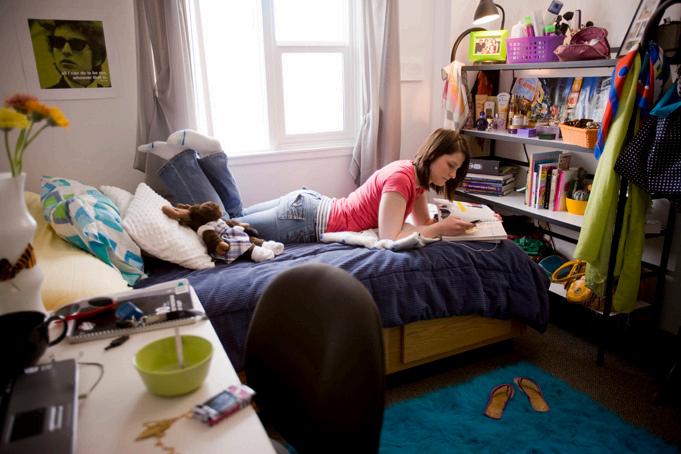

In the event of a fire alarm, quickly exit the building, closing doors and windows along the way. If you see a door propped open, take out the door stop, and make sure it's shut tight. If safe, bring weather-appropriate clothing. Security Services and the Lethbridge Fire Department will be notified and dispatched immediately. During an alarm, RAD will tour as much of the facility as is safe, ensuring occupants evacuate and no one needs assistance. It is a violation of Housing Services policy and Municipal Bylaws to remain indoors while the alarm is sounding. Familiarize yourself with your evacuation assembly point by reviewing the emergency poster in your bedroom.
Fire alarms and equipment are supplied for your protection. Tampering with them could lead to injuries or death, and violators are subject to disciplinary sanctions, financial charges, and/or criminal prosecution.
City of Lethbridge Municipal Bylaw 5542 stipulates a financial fine for any false report of fire, or response by the City of Lethbridge Fire Department to a non–emergency situation. A false alarm is:
A malfunction in a safety monitoring device where the alarm activation was not caused by heat, smoke, or fire. A response initiated by equipment or human negligence where the caller is aware that no actual or possible danger to the safety, health, or welfare of people or the environment exists.
The fine for each University false fire alarm is $75 and all charges due to your actions or negligence will be passed on to you. This includes but is not limited to cooking incidents and steam from showers.
All rooms have smoke detectors. Tampering with or misusing your smoke detector will result in disciplinary sanctions. Do not cover, obstruct, or hang objects from your smoke detector. Immediately report any power outages or activations of heat or smoke detectors in your room or in common areas.
Fire extinguishers are located on every floor of the building and should only be used in emergency situations by those with proper training. Tampering with fire extinguisher seals or pins or discharging a fire extinguisher or hose unnecessarily will result in disciplinary sanctions.
Fire doors are designed to automatically close in the event of a fire alarm. Opening an exterior fire door triggers an alarm at security.
You must evacuate residence during drills and fire alarms. Contact Housing Services when you move into residence or indicate in your Housing Services Application if a physical limitation prevents you from safely exiting during a fire alarm so a plan of support during an evacuation is in place. You must follow all instructions from Fire Department members, Residence Staff, and Fire Wardens during fire alarms.
Please refer to the Residence Fees, Charges, and Fines section of this Contract for more information.
Make sure combustibles, like posters and decorations, do not take up more than 20% of the wall space or door surfaces. Keep the storage of flammable materials to a minimum, at least 18” below the ceiling. Replace frayed or damaged electrical cords and avoid plugging power bars into extension cords. Keep access to fire extinguishers and electrical panels clear at all times and don't block doorways, stairwells, aisles, hallways, or exits.
No candles, open flame, or smoke is allowed in residence due to our water suppression system in all our buildings. If you wish to use candles, an open flame, or smoke for religious, ceremonial, or cultural purposes, please click here to view spaces on campus where it is allowed and reach out to Housing.
Do not smoke inside your room, common spaces, or anywhere else in your residence building.
Never leave appliances or microwaves unattended when in use, and wipe any spills to avoid extra steam or smoke.
Never leave the kitchen area when cooking
Using ovens, toasters, and pans that have grease/ food spills built up - causing smoke to occur when heated
Using personal hygiene devices or aerosol products near or at the detectors (perfumes, colognes, air fresheners)
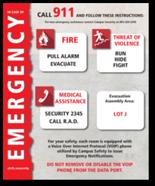
Emergency poster: The poster pictured is inside your residence bedroom. Please locate & familiarize.
Health and safety of residence students, ORS Council, and Housing Services staff is a priority. Housing Services supports risk mitigation strategies and takes steps to ensure all staff are trained and prepared.
ORS Council and Housing Services host many events and activities where staff are trained on risk management processes to ensure activities are reasonably safe.
Residence students must sign a general waiver to participate in most events hosted by ORS Council or Housing Services. Lowrisk events include corn mazes, bowling, and potlucks. Moderate to high-risk events follow a more extensive process. Event plans are evaluated, including consultation and approval by Housing Services, ULethbridge, and the Students’ Union. Additional precautions may be implemented, including: first aid kits, personal protective equipment (PPE), and an event-specific waiver. Examples include travel, ski trips, and aggressive sports.
The University’s Driver Agreement ensures any resident who operates their own personal vehicle in relation to a sanctioned activity has a valid operator’s license recognized in Alberta, meets minimum insurance criteria, and has agreed to required and applicable terms and conditions.
Minor Problems and Incidents
It is important to inform Housing Services, RAD, or Security Services of problems such as a door that won’t lock, a stranger in residence, an overflowing toilet, etc. While these situations may not seem serious, they can escalate if not addressed.
Critical Incidents
A critical incident is defined as any situation, be it perceived or real, that has occurred or has the potential to occur, and involves any aspect of: an unsafe environment, concerning or worrisome behaviour, unresponsiveness, potential harm to one’s self or another, or life-threatening medical need. If you witness such a critical incident, call Security Services or emergency services immediately. In the event a critical incident occurs on campus, you will be informed how to proceed through one or more of the following channels: speaker system, U of L social media, email, etc. Remain calm and follow instructions.
Should any situation or incident, be it perceived, believed, or real, occur or have the potential to occur and involve any aspect of: an unsafe environment; concerning or worrisome behaviour; potential harm to self or another, or an active shooter in the building, the following response procedures should be followed:
Get out – If you think you can safely self-evacuate, do so! Get to a safe location and alert others as you evacuate Hide – Close and lock the door, including barricading it with furniture or other heavy objects. Shut off the lights and stay away from and cover any windows, including door windows. Keep quiet and silence all cell phones, including turning the vibration off
Once you hide, DO NOT exit your hiding place until directed to do so by the police. They will neutralize the threat and conduct a systematic evacuation of all areas on campus, clearing each and every room. Follow and obey the instructions of the Police at all times
Fight – As a last resort only, fight. Commit to aggressive action to defend yourself and stop the threat
Once you are in a safe place:
Immediately contact Emergency Services at 911. Do not assume someone else has made the call
Have another person immediately contact Security Services at 403-329-2345
Provide first aid, if trained and necessary
Security Services and/or Emergency Services will coordinate response procedures. Listen carefully and follow all instructions provided through the University’s Emergency Notification System.
During an active shooter/armed intruder, should a fire alarm occur it is not recommended you act unless you can smell smoke or otherwise confirm a fire exists. If a fire does exist, evacuate carefully and immediately knowing an active shooter/armed intruder could still be at large.
